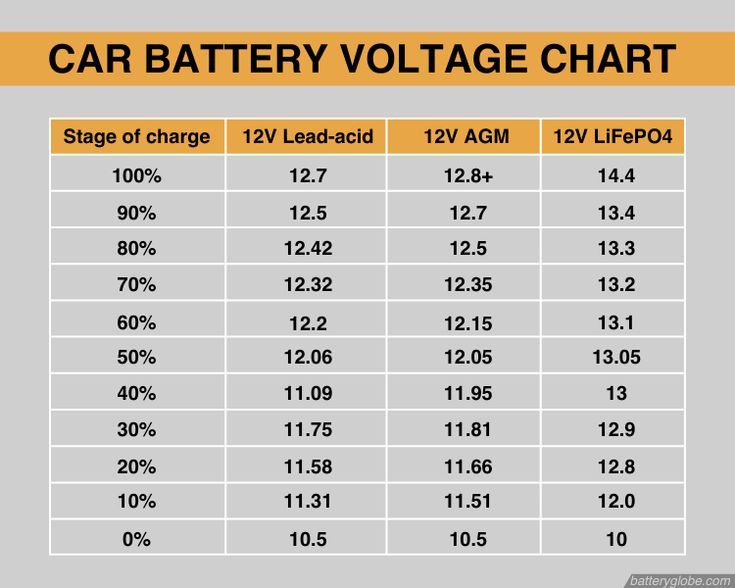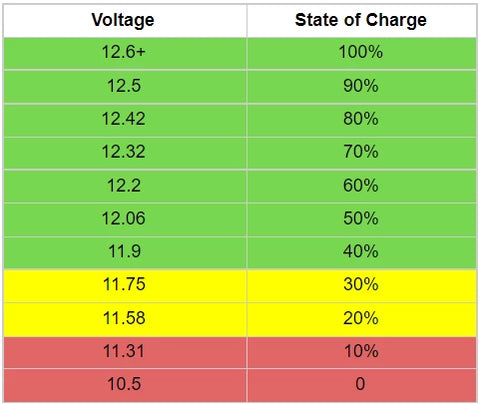Have you ever found yourself stranded with a car that won’t start? It can be frustrating and inconvenient.
One of the common culprits in such situations is a dead or weak car battery. Understanding car battery voltage is crucial for avoiding these headaches and ensuring your vehicle runs smoothly. When you know what the numbers mean, you can easily assess your battery’s health and take action before it leaves you in a bind.
You’ll discover everything you need to know about car battery voltage—what it is, why it matters, and how to check it. Get ready to empower yourself with this essential knowledge and keep your car running like a charm.
Car Battery Basics
A car battery is the heart of your vehicle’s electrical system. It powers everything from the ignition to the lights. Understanding its voltage can help maintain your car’s health. Knowing the basics will make you a more informed car owner.
Components Of A Car Battery
A car battery has several key components. The main parts include lead plates, electrolytes, and terminals. Lead plates store and release electrical energy. Electrolytes are a mix of water and sulfuric acid. They help conduct electricity between the plates. Terminals connect the battery to the car’s electrical system. Each part plays a crucial role in generating power.
Functions Of A Car Battery
The car battery has two primary functions. First, it starts the engine by providing a burst of energy. This energy turns the engine’s starter motor. Second, it powers electrical components when the engine is off. This includes lights, radio, and alarms. The battery also stabilizes voltage, keeping the engine running smoothly.

Credit: www.lokithorshop.com
Understanding Voltage
Car battery voltage measures the electrical potential between terminals. Typically, a healthy car battery should read about 12. 6 volts. This voltage ensures the engine starts smoothly and powers essential electronics in the vehicle.
Understanding voltage is key when it comes to the functionality of car batteries. Ever wondered why your car battery sometimes fails? It might be the voltage. Voltage is like the heartbeat of your battery, determining how well it supplies power to your vehicle’s electrical components. Let’s dive deeper into understanding this crucial concept. ###Definition Of Voltage
Voltage is the electrical force that drives an electric current between two points. Think of it as the pressure that pushes electrons through a circuit. In car batteries, voltage is measured in volts, typically ranging between 12.6 volts when fully charged and around 11.8 volts when discharged. Understanding voltage helps you gauge the health of your battery. A simple voltmeter can give you an instant snapshot of your battery’s condition. Imagine checking the voltage and realizing it’s below the optimal range. It tells you that your battery might need a recharge or replacement. ###Role Of Voltage In Car Batteries
Voltage plays a pivotal role in car batteries by ensuring your vehicle starts smoothly. When you turn the ignition key, it’s the voltage that energizes the starter motor, kick-starting your engine. If the voltage is too low, your car may struggle to start or not start at all. It’s not just about starting the engine. Voltage also powers your lights, radio, and other electronic gadgets in your car. Ever had a road trip where your battery died, leaving your music and navigation off? That’s the voltage at play—or rather, the lack of it. Monitoring your car battery voltage can save you from unexpected breakdowns. Regular checks can alert you to potential issues before they become costly repairs. Have you checked your battery voltage lately? It might be time to grab that voltmeter and make sure everything is running smoothly.Standard Car Battery Voltage
Car battery voltage might seem like a technical term, but it is crucial for the smooth operation of your vehicle. Understanding standard car battery voltage can help you diagnose potential issues and ensure your car runs efficiently. Let’s dive into what you need to know about typical voltage ranges and why maintaining this voltage is essential for your car’s health.
Typical Voltage Range
Most car batteries have a standard voltage of around 12.6 volts when fully charged. This is the sweet spot where your battery functions optimally. When the engine is running, the alternator boosts the voltage to between 13.7 and 14.7 volts to charge the battery.
Have you ever noticed dim headlights? It’s a classic sign that your battery voltage might be dropping below its typical range. A voltage below 12.4 volts could mean trouble, signaling that your battery might be losing its charge or nearing the end of its life.
Keeping a voltmeter handy in your car is a wise move. It allows you to quickly check the battery’s voltage and catch any irregularities before they become serious issues. This simple tool can save you from unexpected breakdowns.
Significance Of Maintaining Voltage
Maintaining the correct car battery voltage is key to avoiding electrical issues. When the voltage drops, it can affect your car’s electrical components, leading to problems like starting difficulties or malfunctioning electronics.
Think of a time when your car wouldn’t start in the morning, leaving you stranded. Often, it’s a low battery voltage that’s the culprit. Regularly checking and maintaining your battery’s voltage can prevent such frustrating situations.
Consider setting a reminder to check your battery voltage monthly. This small step ensures your car’s electrical systems remain in top shape, giving you peace of mind every time you turn the ignition. Isn’t it worth the effort to avoid inconvenient surprises?
Ensuring your battery operates within the standard voltage range not only extends its lifespan but also enhances the overall performance of your vehicle. Staying proactive in monitoring your battery voltage means staying ahead of potential issues.

Credit: www.neware.net
Factors Affecting Battery Voltage
Your car’s battery is like the heart of your vehicle, pumping energy to start the engine and power electrical components. But have you ever wondered why your battery might suddenly lose its charge or struggle to perform efficiently? Understanding the factors affecting battery voltage can save you from unexpected breakdowns and keep your car running smoothly. Let’s dive into some key aspects that influence your car battery’s voltage.
Temperature Effects
Temperature plays a crucial role in battery performance. Cold weather can cause your battery voltage to drop, making it harder for your car to start on chilly mornings. On the flip side, extreme heat can lead to overcharging and battery deterioration. Have you noticed your car struggling more in winter or overheating in summer? It’s not just coincidence—temperature affects the chemical reactions inside the battery, impacting its voltage.
Age And Wear Impact
Batteries don’t last forever. As they age, their ability to hold a charge diminishes. Imagine trying to fill a leaky bucket with water; the water level never quite reaches the top. Similarly, an old battery might not reach its optimal voltage anymore. Regular checks can help you spot signs of wear and avoid getting stranded with a dead battery.
Usage Patterns
How you use your car also influences battery voltage. Short trips might not give your battery enough time to recharge, gradually lowering its voltage. Consider this: if you often find yourself turning on the radio or charging devices while your car is off, you might be draining more power than you realize. Are your usage habits inadvertently draining your battery? Balancing your usage can help maintain healthy voltage levels.
By understanding these factors, you can take proactive steps to maximize your car battery’s lifespan. The next time you face battery issues, ask yourself: is it the temperature, age, or perhaps your usage patterns affecting the voltage? Addressing these aspects might just keep your car’s heart beating strong.
Measuring Battery Voltage
Car battery voltage indicates its charge level and health. Typically, a fully charged car battery reads around 12. 6 volts. Lower readings may suggest issues needing attention.
Measuring the voltage of your car battery is a fundamental skill for any vehicle owner. Understanding how to do this can save you time and prevent potential headaches down the road. If you’ve ever wondered why your car won’t start on a chilly morning or why your headlights seem dimmer than usual, checking the battery voltage might offer some insights. Let’s dive into how you can measure your car battery voltage accurately and efficiently. ###Tools For Measurement
To measure your car battery voltage, you’ll need the right tools. A multimeter is the most common device used for this purpose. It’s a versatile tool that can measure voltage, current, and resistance. You can find multimeters at most auto parts stores or online. They vary in price, but a basic model will suffice for simple voltage checks. Ensure your multimeter has a clear digital display for easy reading. Aside from a multimeter, you might consider using a battery tester. These are specifically designed for checking car batteries and often provide additional information about the battery’s health. ###Steps For Accurate Measurement
First, ensure your car is off and the keys are out of the ignition. This prevents any electrical interference during your measurement. Safety first! Next, set your multimeter to the DC voltage setting. Most car batteries are 12 volts, so set the multimeter to the 20 volts range to get an accurate reading. Connect the multimeter probes to the battery terminals. The red probe goes to the positive terminal, and the black probe connects to the negative terminal. Ensure the connection is firm to avoid fluctuating readings. Once connected, read the voltage on the multimeter display. A healthy, fully charged car battery should read around 12.6 volts or slightly higher. If it reads below 12 volts, your battery might be undercharged or near the end of its life. Regularly checking your battery voltage can help you catch issues early. If your battery often reads low, it might be time to consider a replacement or visit a mechanic. How often do you check your car battery voltage? Keeping a simple tool like a multimeter in your car can make all the difference in maintaining battery health.Troubleshooting Voltage Issues
Car battery voltage plays a crucial role in vehicle performance. Voltage issues can lead to starting problems or electrical malfunctions. Understanding and resolving these issues ensures a smooth driving experience. Knowing common voltage problems helps in effective troubleshooting. Solutions for voltage drop can restore battery efficiency. Let’s dive deeper into these aspects.
Common Voltage Problems
Low voltage often results from a weak battery. This can cause the car not to start. Corroded terminals can also lead to voltage issues. Another common problem is a failing alternator. It fails to charge the battery properly. Parasitic drains can silently deplete battery voltage. These drains occur when devices draw power even when off. Identifying these problems early prevents major issues.
Solutions For Voltage Drop
Check the battery terminals regularly. Clean them to ensure proper connection. Inspect the alternator to confirm it’s working well. Replace it if not charging the battery. Use a multimeter to check for parasitic drains. Disconnect devices to stop unnecessary power draw. Ensure the battery is in good condition. Replace old or weak batteries promptly. Regular maintenance helps avoid voltage drops.
Enhancing Battery Performance
Understanding car battery voltage is key to enhancing battery performance. A typical car battery operates at around 12 volts. Regular checks ensure it stays at optimal levels, preventing issues like slow engine starts.
Enhancing the performance of your car battery can make a significant difference in your vehicle’s reliability and longevity. If you’ve ever experienced the frustration of a dead battery, you know how crucial it is to maintain optimal voltage. Just like that time my car wouldn’t start on a freezing winter morning because the battery voltage had dropped too low, it’s moments like these that remind you of the importance of proper battery care. So, how can you ensure your car battery is always ready to power your adventures?Tips For Optimal Voltage Maintenance
To keep your car battery in peak condition, start by regularly checking the battery voltage. A multimeter is a handy tool for this. Aim for a voltage reading between 12.4 to 12.7 volts when the engine is off. This ensures your battery is charged and ready. Clean your battery terminals to prevent corrosion. Corroded terminals can cause a drop in voltage, affecting the battery’s performance. A simple mix of baking soda and water can help you remove any buildup. Another tip is to limit short trips. Short drives don’t give your battery enough time to recharge fully. Consider taking your car for a longer drive once a week to keep the battery healthy.Upgrading To Advanced Battery Technologies
Have you considered upgrading your car battery? Advanced battery technologies like AGM (Absorbent Glass Mat) batteries offer better performance. They have higher power output and are more resistant to vibration, making them a great choice for modern vehicles. Lithium-ion batteries are another option. They are lighter and have a longer lifespan compared to traditional lead-acid batteries. Although they may be more expensive upfront, they can save you money in the long run due to their durability and efficiency. Could investing in these advanced technologies be the key to hassle-free driving? Upgrading might require a bit of upfront cost, but the enhanced performance and peace of mind could be worth it. When was the last time you thought about your car battery’s health? Whether through maintenance or upgrades, taking proactive steps can save you from unexpected breakdowns and ensure your car is always ready to go.
Credit: www.jiffylube.com
Frequently Asked Questions
What Is A Bad Voltage For A Car Battery?
A car battery voltage below 12. 4 volts is considered bad. It indicates a weak or discharged battery. Check the battery condition if the voltage drops below this level. Regular testing and maintenance can help ensure optimal battery performance.
Is 11.9 Volts Enough To Start A Car?
11. 9 volts might be too low to start a car. Most cars need at least 12. 4 volts. Low voltage can indicate a weak or drained battery, which might not provide enough power for the engine. Always ensure the battery is fully charged for reliable starting.
At What Voltage Should A Car Battery Be Replaced?
Replace a car battery when voltage drops below 12. 4 volts. A fully charged battery should read around 12. 6 volts. Regular checks help maintain battery health.
What Percentage Is Too Low For A Car Battery?
A car battery is considered too low below 12. 4 volts. Charging is necessary to avoid starting issues. Maintaining a charge above this level ensures optimal performance and longevity. Regular checks can help prevent unexpected failures.
Conclusion
Understanding car battery voltage is crucial for vehicle maintenance. Knowing the right voltage helps avoid unexpected breakdowns. Regular checks ensure your battery stays healthy. A multimeter can measure voltage easily. A typical car battery should read around 12. 6 volts when fully charged.
If the voltage drops below 12 volts, it might be time to recharge or replace. Always consult a professional if unsure about battery conditions. Proper care extends your battery’s life and keeps your car running smoothly. Stay informed. Stay safe.
Your car depends on it.

